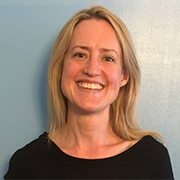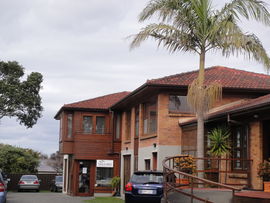North Auckland > GPs / Accident & Urgent Medical Care > ProCare >
Milford Family Medical Centre
General Practice (GP) Service
Today
8:00 AM to 5:00 PM.
Staff
Practice Manager: Joel Razon
Nursing Staff: Gizelle, Isabella
Receptionists: Trish, Barbara, and Marie
Doctors
-

Dr Paul Butler
General Practitioner - Vocationally Registered
-

Dr Anna (Jing) Chen
General Practitioner- Vocationally Registered
-

Dr Eva Hay
General Practitioner - Vocationally Registered
-

Dr Rukshi Lewis
General Practitioner
-

Dr Chris Maud
General Practitioner - Vocationally Registered
-

Dr Caroline Meade
General Practitioner - Vocationally Registered
-

Dr Meg Thomson
General Practitioner - Vocationally Registered
How do I access this service?
Make an appointment
You can book online via our Portal 'Manage My Health' or phone reception
Enrolled patients
For appointments, lab results and to order your regular prescriptions.
You can book online via our Portal 'Manage My Health'
For non-urgent clinical inquiries, prescription requests you can also email us at nurse@milfordmedical.co.nz
For prescriptions, please state your name and medication required and preferred Pharmacy name and location. Prescription requests can take up to 48 hours.
Emails are cleared Monday through Friday from 9am to 3pm
Contact us
Our website is https://www.milfordfamilymedical.com to find more information and the online enrolment form
By Phone on 09 449 0005
Anyone can access
Our website is https://www.milfordfamilymedical.com to find more information and the online enrolment form
Enrolling new patients
Yes
This practice is welcoming new patients to enrol.
Dr Rukshi Lewis, Dr Meg Thomson, Dr. Tim Rigg and Dr. Anna Chen are available for New Patient enrolments.
Go to our Website https://www.milfordfamilymedical.com
Or you can enrol online here Registration Form
Go to link above, click though to complete the form, you will need to upload a photo of your passport, and your visa if you dont have a NZ passport.
Fees
Enrolled Patient Fees
| Age Range | Without CSC | With CSC |
|---|---|---|
| Under 6 years | Free | Free |
| 6 to 13 years | Free | Free |
| 14 to 17 years | $60.00 | $13.50 |
| 18 to 24 years | $75.00 | $20.00 |
| 25 to 44 years | $78.00 | $20.00 |
| 45 to 64 years | $78.00 | $20.00 |
| 65+ years | $74.00 | $20.00 |
First visit Medical
0 to 13 years
Free
14 to 17 years
$130 without CSC and $40 with CSC
18 to 24 years
$130 without CSC and $40 with CSC
25 to 64 years
$130 without CSC and $40 with CSC
65+
$130 without CSC and $40 with CSC
ACC Surcharge (ACC appointments may have a surcharge for Doctor & Nurse consultations and treatments)
Enrolled children 14-17yrs
ACC first visit $52.
ACC follow-up $52
ACC with CSC- $20.00
Enrolled adults
ACC first visit $65.
ACC follow-up $60
ACC with CSC $20.00
Adults over 65
ACC first visit $65.
ACC follow-up $50
ACC with CSC $20.00
Non-NZ & visitors
Standard appointment $170. ACC Visit $110
Casual NZ resident
Previously enrolled $110. New to us $150. ACC Visit $110
Hours
8:00 AM to 5:00 PM.
| Mon – Fri | 8:00 AM – 5:00 PM |
|---|
In a medical emergency, such as severe pain, collapse, heavy bleeding, or shortness of breath, you should call 111 immediately.
YOUR GP HOURS ARE AS FOLLOWS
Dr Chris Maud Mon (2pm-5pm) and Wed (3pm-5pm)
Dr Eva Hay Mon 1pm - 5pm, Tue 8am-4.30pm, Thu & Fri 8am-1pm
Dr Caroline Meade Mon & Wed 9am-4pm
Dr Rukshi Lewis Mon, Wed,Friday 9am- 5pm, Thu 1pm-5pm
Dr. Tim Rigg Tue, Thu, Fri- 8-5 and Wed 1-5pm
Dr Meg Thomson Mon - Fri 9.15am -1pm
Dr Paul Butler Various times
Dr. Anna Chen Tues, Thu and Fri- 9:30am- 1:30pm
After Hours Cover:
Go to Shorecare Smales Farm 74 Taharoto Rd Open 24hrs 365 days Ph 09 4867777 ext 1 or
Shorecare Greville Rd 50 Greville Rd Open 8am-8pm 365 days Ph 09 4867777 ext 2
Public Holidays: Closed Waitangi Day (6 Feb), Good Friday (3 Apr), Easter Sunday (5 Apr), Easter Monday (6 Apr), ANZAC Day (observed) (27 Apr), King's Birthday (1 Jun), Matariki (10 Jul), Labour Day (26 Oct).
Preferred urgent care clinic out of hours: Shorecare Urgent Care Smales Farm.
Languages Spoken
English, German, Filipino
Services Provided
Immunisation is the safest and most effective way to provide protection for you and your tamariki’s health. For more information view the NZ immunisation schedule.
Immunisation is the safest and most effective way to provide protection for you and your tamariki’s health. For more information view the NZ immunisation schedule.
- Pregnancy vaccinations
- Childhood immunisation programme
- 45 year old vaccinations
- 65 year old vaccinations
- Adult flu vaccine
- Child flu vaccine
- Human Papillomavirus (HPV) vaccine
- Diphtheria / Tetanus / Pertussis (whooping cough) vaccine
- Measles / Mumps / Rubella (MMR) vaccine
- Meningococcal vaccine
- Shingles vaccine
- Travel vaccinations
- Catch-up missed vaccinations
- Privately funded vaccinations
- Workplace flu vaccinations
Immunisation is the safest and most effective way to provide protection for you and your tamariki’s health. For more information view the NZ immunisation schedule.
Your GP's surgery is far more than a place to go when you are feeling unwell and needing a quick cure. The doctor who sees you has gone through an extensive medical training to equip her or him to help children and adults of all ages with a range of physical and emotional difficulties. GPs are at the centre of the healthcare hub and will be aware of services and expertise that are available locally and further-a-field. GPs are also aware of the link that stress and unhappy life events have on physical health so know when to suggest a talking therapy rather than medication.
Your GP's surgery is far more than a place to go when you are feeling unwell and needing a quick cure. The doctor who sees you has gone through an extensive medical training to equip her or him to help children and adults of all ages with a range of physical and emotional difficulties. GPs are at the centre of the healthcare hub and will be aware of services and expertise that are available locally and further-a-field. GPs are also aware of the link that stress and unhappy life events have on physical health so know when to suggest a talking therapy rather than medication.
Your GP's surgery is far more than a place to go when you are feeling unwell and needing a quick cure. The doctor who sees you has gone through an extensive medical training to equip her or him to help children and adults of all ages with a range of physical and emotional difficulties. GPs are at the centre of the healthcare hub and will be aware of services and expertise that are available locally and further-a-field. GPs are also aware of the link that stress and unhappy life events have on physical health so know when to suggest a talking therapy rather than medication.
Health screening tests check for health conditions or early warning signs of disease.
Health screening tests check for health conditions or early warning signs of disease.
- Cervical screening
- Breast check (clinical breast exam)
- Throat swab for rheumatic fever prevention
- Prostate check
Health screening tests check for health conditions or early warning signs of disease.
Primary care practices offer a range of services and are able to deal with most minor accident care. If they are not able to deal with an injury they will refer on to the appropriate service.
Primary care practices offer a range of services and are able to deal with most minor accident care. If they are not able to deal with an injury they will refer on to the appropriate service.
Primary care practices offer a range of services and are able to deal with most minor accident care. If they are not able to deal with an injury they will refer on to the appropriate service.
Minor surgery is commonly provided in primary care practices, providing fast, competent removal and biopsies of skin lesions. Other services include cosmetic work such as removal of benign moles and skin tags. Ingrown toenail surgery is also commonly provided. These conditions do not need to be referred to a hospital, perhaps saving you a long wait or a cancelled appointment when a more serious case takes priority.
Minor surgery is commonly provided in primary care practices, providing fast, competent removal and biopsies of skin lesions. Other services include cosmetic work such as removal of benign moles and skin tags. Ingrown toenail surgery is also commonly provided. These conditions do not need to be referred to a hospital, perhaps saving you a long wait or a cancelled appointment when a more serious case takes priority.
Minor surgery is commonly provided in primary care practices, providing fast, competent removal and biopsies of skin lesions. Other services include cosmetic work such as removal of benign moles and skin tags. Ingrown toenail surgery is also commonly provided.
These conditions do not need to be referred to a hospital, perhaps saving you a long wait or a cancelled appointment when a more serious case takes priority.
Each GP surgery or primary care practice will have its own procedure for repeat prescribing but the following rules are common to most, if not all. Patients who are well-known to the practice who have a stable condition like asthma, hypertension or diabetes could be allowed to get a repeat prescription for up to six months. Repeat prescriptions are never given to patients who are not known to the practice and there is probably a blanket ban on repeats for narcotics and other drugs that could be misused as doctors are expected to monitor these drugs carefully. Your GP may need to review you 3-6 monthly if you have a long term medical condition or if you have not been seen for over a year. You can request your prescription by Manage My Health https://managemyhealth.co.nz ($35) or Email nuese@milfordmedical.co.nz ($40) stating your Name, Date of Birth, NHI, Medications required and your preferred Pharmacy. We will then email your prescription directly to your preferred Pharmacy within 72 hours. If you wish to collect your prescription, please notify us when requesting your prescription. If your prescription request is urgent please advise us and the fee is $45.
Each GP surgery or primary care practice will have its own procedure for repeat prescribing but the following rules are common to most, if not all. Patients who are well-known to the practice who have a stable condition like asthma, hypertension or diabetes could be allowed to get a repeat prescription for up to six months. Repeat prescriptions are never given to patients who are not known to the practice and there is probably a blanket ban on repeats for narcotics and other drugs that could be misused as doctors are expected to monitor these drugs carefully. Your GP may need to review you 3-6 monthly if you have a long term medical condition or if you have not been seen for over a year. You can request your prescription by Manage My Health https://managemyhealth.co.nz ($35) or Email nuese@milfordmedical.co.nz ($40) stating your Name, Date of Birth, NHI, Medications required and your preferred Pharmacy. We will then email your prescription directly to your preferred Pharmacy within 72 hours. If you wish to collect your prescription, please notify us when requesting your prescription. If your prescription request is urgent please advise us and the fee is $45.
Each GP surgery or primary care practice will have its own procedure for repeat prescribing but the following rules are common to most, if not all. Patients who are well-known to the practice who have a stable condition like asthma, hypertension or diabetes could be allowed to get a repeat prescription for up to six months. Repeat prescriptions are never given to patients who are not known to the practice and there is probably a blanket ban on repeats for narcotics and other drugs that could be misused as doctors are expected to monitor these drugs carefully.
Your GP may need to review you 3-6 monthly if you have a long term medical condition or if you have not been seen for over a year.
You can request your prescription by
Manage My Health https://managemyhealth.co.nz ($35) or
Email ($40)
stating your Name, Date of Birth, NHI, Medications required and your preferred Pharmacy.
We will then email your prescription directly to your preferred Pharmacy within 72 hours.
If you wish to collect your prescription, please notify us when requesting your prescription.
If your prescription request is urgent please advise us and the fee is $45.
Sometimes your doctor needs to take a sample of blood or urine either to discover what is wrong with you or to measure something in your blood so that the right medication is given to you. These tests could be anything from blood sugar to a full blood count or a sample of tissue to test for cancer. While urine can generally be tested in the surgery, blood and other specimens are usually sent away for testing at a laboratory. Most results come back within 48 hours unless a very rare test is needed which has to go to a specialist lab further away when it might take a little longer.
Sometimes your doctor needs to take a sample of blood or urine either to discover what is wrong with you or to measure something in your blood so that the right medication is given to you. These tests could be anything from blood sugar to a full blood count or a sample of tissue to test for cancer. While urine can generally be tested in the surgery, blood and other specimens are usually sent away for testing at a laboratory. Most results come back within 48 hours unless a very rare test is needed which has to go to a specialist lab further away when it might take a little longer.
Sometimes your doctor needs to take a sample of blood or urine either to discover what is wrong with you or to measure something in your blood so that the right medication is given to you. These tests could be anything from blood sugar to a full blood count or a sample of tissue to test for cancer.
While urine can generally be tested in the surgery, blood and other specimens are usually sent away for testing at a laboratory. Most results come back within 48 hours unless a very rare test is needed which has to go to a specialist lab further away when it might take a little longer.
If a man decides he does not want to father children, he may choose to have a vasectomy which is a simple and effective method of sterilisation. During this surgical procedure, the vas deferens (the tubes carrying sperm from the testicles to the penis) are cut. A vasectomy can be carried out in a doctor's surgery and takes between 30 and 60 minutes.
If a man decides he does not want to father children, he may choose to have a vasectomy which is a simple and effective method of sterilisation. During this surgical procedure, the vas deferens (the tubes carrying sperm from the testicles to the penis) are cut. A vasectomy can be carried out in a doctor's surgery and takes between 30 and 60 minutes.
If a man decides he does not want to father children, he may choose to have a vasectomy which is a simple and effective method of sterilisation.
During this surgical procedure, the vas deferens (the tubes carrying sperm from the testicles to the penis) are cut. A vasectomy can be carried out in a doctor's surgery and takes between 30 and 60 minutes.
Liquid nitrogen is a fast, effective treatment provided in many practices to treat viral warts, sun damaged skin, skin tags and many benign cosmetic lesions. It comes in a container with a nozzle and is usually applied by swab or spray. Often one treatment is all that is needed but sometimes it may need repeating after two weeks. Because it cannot be stored for too long, you will often find that your GP will treat a number of patients one after the other. For more information click here.
Liquid nitrogen is a fast, effective treatment provided in many practices to treat viral warts, sun damaged skin, skin tags and many benign cosmetic lesions. It comes in a container with a nozzle and is usually applied by swab or spray. Often one treatment is all that is needed but sometimes it may need repeating after two weeks. Because it cannot be stored for too long, you will often find that your GP will treat a number of patients one after the other. For more information click here.
Liquid nitrogen is a fast, effective treatment provided in many practices to treat viral warts, sun damaged skin, skin tags and many benign cosmetic lesions. It comes in a container with a nozzle and is usually applied by swab or spray. Often one treatment is all that is needed but sometimes it may need repeating after two weeks.
Because it cannot be stored for too long, you will often find that your GP will treat a number of patients one after the other.
For more information click here.
LARC methods are very effective at preventing unplanned pregnancy and are “fit and forget” forms of contraception – you don’t need to remember them every day or every month. LARC methods: Intrauterine Contraceptive Devices (IUCD or IUD) are inserted through the cervix into a woman’s uterus. IUCDs may be either hormonal (Mirena® or Jaydess® ) or non-hormonal (copper IUCD). Jadelle® is a hormone-releasing implant that is inserted just under the skin of the upper arm. Depending on the type of device, it will need to be changed after between three and ten years. Read more about LARC methods here Mirena IUCD insertions are also offered by Dr Eva Hay.
LARC methods are very effective at preventing unplanned pregnancy and are “fit and forget” forms of contraception – you don’t need to remember them every day or every month. LARC methods: Intrauterine Contraceptive Devices (IUCD or IUD) are inserted through the cervix into a woman’s uterus. IUCDs may be either hormonal (Mirena® or Jaydess® ) or non-hormonal (copper IUCD). Jadelle® is a hormone-releasing implant that is inserted just under the skin of the upper arm. Depending on the type of device, it will need to be changed after between three and ten years. Read more about LARC methods here Mirena IUCD insertions are also offered by Dr Eva Hay.
- Implant (Jadelle) inserts
- IUD inserts
- Implant (Jadelle) removal
- IUD removals
LARC methods are very effective at preventing unplanned pregnancy and are “fit and forget” forms of contraception – you don’t need to remember them every day or every month. LARC methods:
- Intrauterine Contraceptive Devices (IUCD or IUD) are inserted through the cervix into a woman’s uterus. IUCDs may be either hormonal (Mirena® or Jaydess® ) or non-hormonal (copper IUCD).
- Jadelle® is a hormone-releasing implant that is inserted just under the skin of the upper arm.
Depending on the type of device, it will need to be changed after between three and ten years.
Read more about LARC methods here
Mirena IUCD insertions are also offered by Dr Eva Hay.
An ECG is a recording of your heart's electrical activity. Electrode patches are attached to your skin to measure the electrical impulses given off by your heart. The result is a trace that can be read by a doctor. It can give information of previous heart attacks or problems with the heart rhythm.
An ECG is a recording of your heart's electrical activity. Electrode patches are attached to your skin to measure the electrical impulses given off by your heart. The result is a trace that can be read by a doctor. It can give information of previous heart attacks or problems with the heart rhythm.
An ECG is a recording of your heart's electrical activity. Electrode patches are attached to your skin to measure the electrical impulses given off by your heart. The result is a trace that can be read by a doctor. It can give information of previous heart attacks or problems with the heart rhythm.
All women and people with a cervix aged 25 – 69 who have ever had intimate skin-to-skin contact or been sexually active should have regular cervical screening. This includes women who have been immunised against HPV. Together, regular screening and HPV immunisation provide the best protection against cervical cancer. There are now more options for how you have cervical screening done: a simple vaginal swab test for HPV, either done yourself or with help from a healthcare professional a cervical sample taken by a healthcare professional (used to be known as a smear test). Talk with your healthcare provider to decide which option is best for you. If HPV is found, you may need to have a follow-up test or be referred directly for colposcopy. If you’ve not yet had HPV testing, you should be screened 3 years after your last test (or 1 year if immune deficient). Once you have had an HPV test, and providing HPV is not found, your next screening will be in 5 years (or 3 years if immune deficient). For more information: Cervical screening | Time to Screen - National Screening Unit
All women and people with a cervix aged 25 – 69 who have ever had intimate skin-to-skin contact or been sexually active should have regular cervical screening. This includes women who have been immunised against HPV. Together, regular screening and HPV immunisation provide the best protection against cervical cancer. There are now more options for how you have cervical screening done: a simple vaginal swab test for HPV, either done yourself or with help from a healthcare professional a cervical sample taken by a healthcare professional (used to be known as a smear test). Talk with your healthcare provider to decide which option is best for you. If HPV is found, you may need to have a follow-up test or be referred directly for colposcopy. If you’ve not yet had HPV testing, you should be screened 3 years after your last test (or 1 year if immune deficient). Once you have had an HPV test, and providing HPV is not found, your next screening will be in 5 years (or 3 years if immune deficient). For more information: Cervical screening | Time to Screen - National Screening Unit
All women and people with a cervix aged 25 – 69 who have ever had intimate skin-to-skin contact or been sexually active should have regular cervical screening. This includes women who have been immunised against HPV. Together, regular screening and HPV immunisation provide the best protection against cervical cancer.
There are now more options for how you have cervical screening done:
- a simple vaginal swab test for HPV, either done yourself or with help from a healthcare professional
- a cervical sample taken by a healthcare professional (used to be known as a smear test).
Talk with your healthcare provider to decide which option is best for you.
If HPV is found, you may need to have a follow-up test or be referred directly for colposcopy.
If you’ve not yet had HPV testing, you should be screened 3 years after your last test (or 1 year if immune deficient). Once you have had an HPV test, and providing HPV is not found, your next screening will be in 5 years (or 3 years if immune deficient).
For more information: Cervical screening | Time to Screen - National Screening Unit
Another service offered to you at your GP surgery (primary care practice) is advice and immunisation before you go to another country. While you are likely to have the immunisations needed to live in New Zealand, there may be other injections you need to protect yourself before going for example to Africa or South America. In some places you will need protection from rabies or malaria. Yellow fever vaccinations are only available at approved centres; please click here to view the centres in New Zealand. Your doctor will be able to tell you what diseases you will need to be protected from in any named country and advise you on other medical matters. Most Travel vaccines will require an Appointment and Prescription from your GP and Pre-payment before administering them by the nurse.
Another service offered to you at your GP surgery (primary care practice) is advice and immunisation before you go to another country. While you are likely to have the immunisations needed to live in New Zealand, there may be other injections you need to protect yourself before going for example to Africa or South America. In some places you will need protection from rabies or malaria. Yellow fever vaccinations are only available at approved centres; please click here to view the centres in New Zealand. Your doctor will be able to tell you what diseases you will need to be protected from in any named country and advise you on other medical matters. Most Travel vaccines will require an Appointment and Prescription from your GP and Pre-payment before administering them by the nurse.
Another service offered to you at your GP surgery (primary care practice) is advice and immunisation before you go to another country. While you are likely to have the immunisations needed to live in New Zealand, there may be other injections you need to protect yourself before going for example to Africa or South America. In some places you will need protection from rabies or malaria. Yellow fever vaccinations are only available at approved centres; please click here to view the centres in New Zealand. Your doctor will be able to tell you what diseases you will need to be protected from in any named country and advise you on other medical matters.
Most Travel vaccines will require an Appointment and Prescription from your GP and Pre-payment before administering them by the nurse.
All New Zealand children are entitled to 11 free health checks from birth to three years. The checks aim to ensure that children are growing and developing as well as possible. Included in the checks are clinical assessment, health education and family/whanau support. Baby checks are at birth and then at 24 hours, five days and around 2-4 weeks. Babies are weighed and measured to ensure that they are developing correctly. These sessions provide a great opportunity for parents to ask questions from an expert and have any problem addressed; difficulties with breastfeeding or sleep for example. They can also be used to discuss immunisations and vaccinations. These checks will be carried out by your lead maternity carer (LMC). Between the ages of 4-6 weeks and three years, there are seven core health checks available, typically these are around 4-6 weeks, 8-10 weeks, 3-4 months, 5-7 months, 9-12 months, 15-18 months and 2-3 years. These checks may be carried out by a Well Child Provider of your choice e.g. Plunket, Maori health provider, community nurse, a general practice team (doctor and practice nurse). Your LMC will be able to give you a list of Well Child Providers in your area. More information about Well Child services is available on the Ministry of Health website.
All New Zealand children are entitled to 11 free health checks from birth to three years. The checks aim to ensure that children are growing and developing as well as possible. Included in the checks are clinical assessment, health education and family/whanau support. Baby checks are at birth and then at 24 hours, five days and around 2-4 weeks. Babies are weighed and measured to ensure that they are developing correctly. These sessions provide a great opportunity for parents to ask questions from an expert and have any problem addressed; difficulties with breastfeeding or sleep for example. They can also be used to discuss immunisations and vaccinations. These checks will be carried out by your lead maternity carer (LMC). Between the ages of 4-6 weeks and three years, there are seven core health checks available, typically these are around 4-6 weeks, 8-10 weeks, 3-4 months, 5-7 months, 9-12 months, 15-18 months and 2-3 years. These checks may be carried out by a Well Child Provider of your choice e.g. Plunket, Maori health provider, community nurse, a general practice team (doctor and practice nurse). Your LMC will be able to give you a list of Well Child Providers in your area. More information about Well Child services is available on the Ministry of Health website.
All New Zealand children are entitled to 11 free health checks from birth to three years. The checks aim to ensure that children are growing and developing as well as possible. Included in the checks are clinical assessment, health education and family/whānau support.
Baby checks are at birth and then at 24 hours, five days and around 2-4 weeks. Babies are weighed and measured to ensure that they are developing correctly. These sessions provide a great opportunity for parents to ask questions from an expert and have any problem addressed; difficulties with breastfeeding or sleep for example. They can also be used to discuss immunisations and vaccinations. These checks will be carried out by your lead maternity carer (LMC).
Between the ages of 4-6 weeks and three years, there are seven core health checks available, typically these are around 4-6 weeks, 8-10 weeks, 3-4 months, 5-7 months, 9-12 months, 15-18 months and 2-3 years. These checks may be carried out by a Well Child Provider of your choice e.g. Plunket, Māori health provider, community nurse, a general practice team (doctor and practice nurse). Your LMC will be able to give you a list of Well Child Providers in your area.
More information about Well Child services is available on the Ministry of Health website.
A patient portal is a secure online tool provided by GP practices that can allow convenient access to your health information as well as interaction with the practice e.g. booking appointments and requesting repeat prescriptions.
A patient portal is a secure online tool provided by GP practices that can allow convenient access to your health information as well as interaction with the practice e.g. booking appointments and requesting repeat prescriptions.
A patient portal is a secure online tool provided by GP practices that can allow convenient access to your health information as well as interaction with the practice e.g. booking appointments and requesting repeat prescriptions.
Sexual and reproductive health services including sexual health screening, information and birth control.
Sexual and reproductive health services including sexual health screening, information and birth control.
- Contraception (birth control) advice
- Menopause
- STD checks (Sexually transmitted disease)
- Male sexual health
- Pregnancy testing
Sexual and reproductive health services including sexual health screening, information and birth control.
This service offers support to people who are overweight or obese to reach and maintain a healthy weight. Weight loss approaches may involve diet and lifestyle changes or weight loss medications, or both may be offered.
This service offers support to people who are overweight or obese to reach and maintain a healthy weight. Weight loss approaches may involve diet and lifestyle changes or weight loss medications, or both may be offered.
This service offers support to people who are overweight or obese to reach and maintain a healthy weight. Weight loss approaches may involve diet and lifestyle changes or weight loss medications, or both may be offered.
Disability Assistance
Wheelchair access, Mobility parking space
Online Booking URL
Public Transport
Bus stop across the road
Parking
Parking onsite or on the road nearby
Website
Contact Details
50 East Coast Road, Milford, Auckland
North Auckland
8:00 AM to 5:00 PM.
-
Phone
(09) 449 0005
Healthlink EDI
milfordc
Email
Website
nurse@milfordmedical.co.nz
50 East Coast Road
Milford
Auckland 0620
Street Address
50 East Coast Road
Milford
Auckland 0620
Postal Address
50 East Coast Road
Milford
Auckland 0620
Would you recommend this service to family & friends?
See ReviewsWas this page helpful?
This page was last updated at 12:15PM on February 23, 2026. This information is reviewed and edited by Milford Family Medical Centre.

